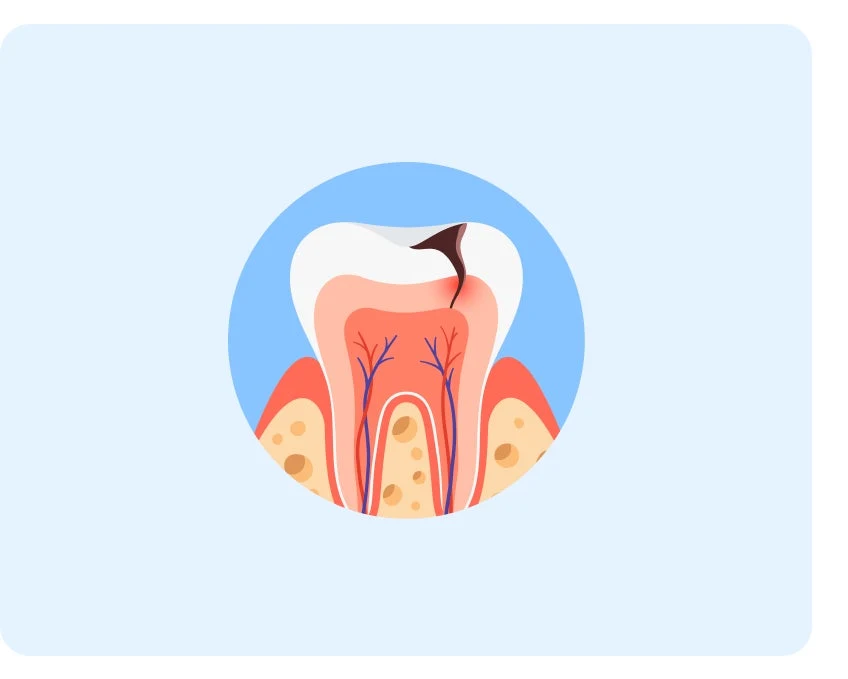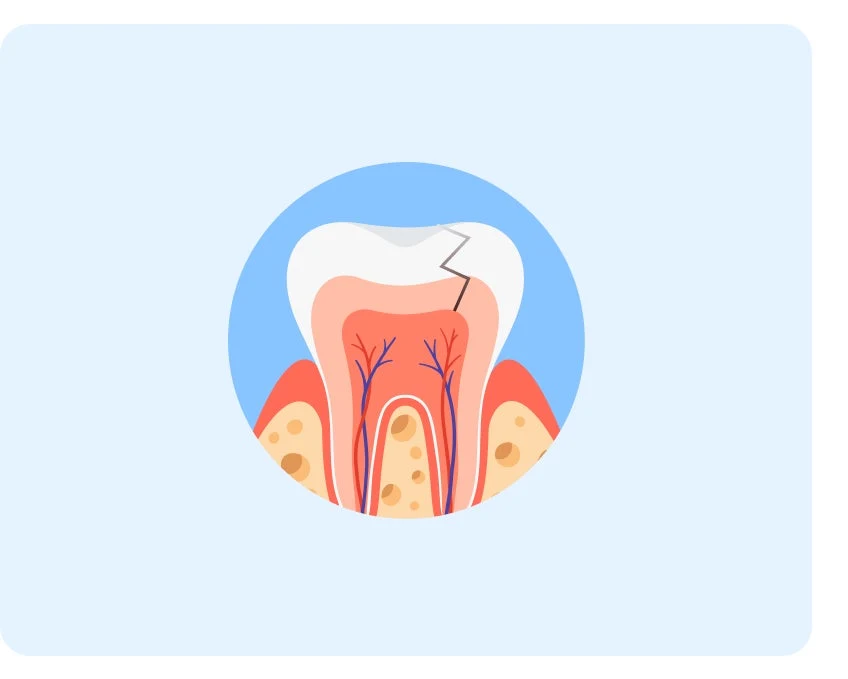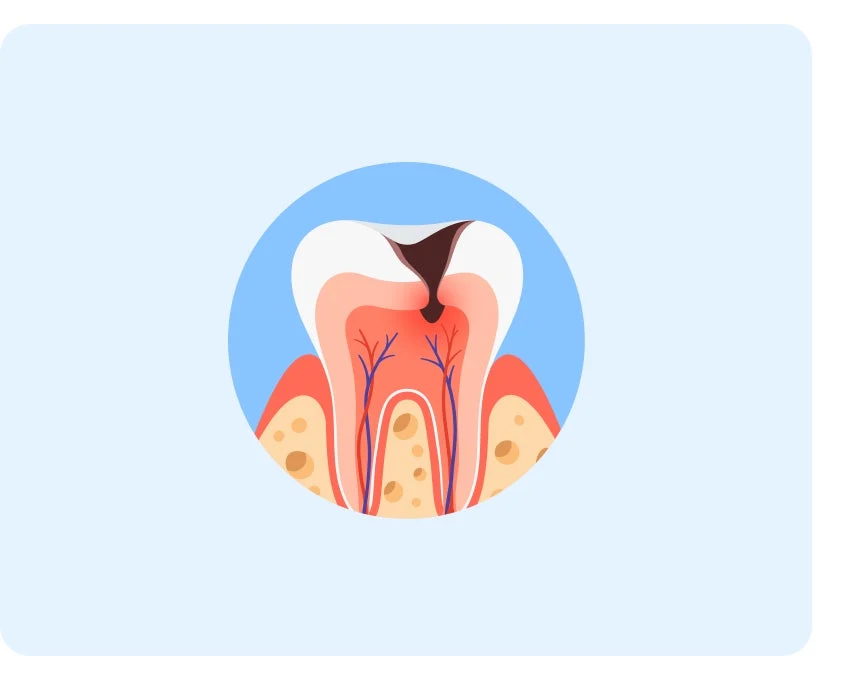Endodontist and endodontics
Your endodontic care is in skilled hands. Discover the expertise and precision that an endodontist brings to your dental health, at Aspen Dental.
What is an endodontist?
An endodontist is a dental professional who specializes in treating issues related to the dental pulp and the roots of teeth. Endodontists undergo additional years of training beyond dental school to acquire the skills and expertise necessary for performing complex root canal treatments, managing dental trauma, and addressing various pulp-related conditions.
Importance of endodontic treatment
Endodontic treatment is essential for preserving natural teeth and limiting the need for tooth extraction. By removing infected or inflamed pulp, an endodontist can help relieve pain, save teeth from further damage and help restore overall oral health.
Primary procedures performed by endodontists
Root canal therapy
The most common procedure performed by an endodontist is the root canal procedure. It involves removing infected or damaged pulp, cleaning and shaping the root canal system, then filling and sealing it to lessen future infection.
Learn more about root canal >
Endodontic retreatment
Sometimes, a tooth that has undergone a root canal may not heal properly or may develop new problems. Endodontic retreatment involves reopening the tooth to address these issues and save the tooth.
Apicoectomy
Also known as root-end resection, in this surgical procedure, the endodontist opens the gum tissue near the tooth’s root to expose the underlying bone and remove any inflamed or infected tissue. An apicoectomy is performed when conventional root canal therapy isn't sufficient to save the tooth.
When to see an endodontist
You’ll know when it’s time to see an endodontist when your dentist refers you. Your dentist will be able to diagnose certain dental issues that would require the expertise of an endodontist. Some of thes dental issues requiring endodontic therapy could be:

Severe tooth decay
Decay reaching the tooth pulp, causing damage and infection

Traumatic dental injuries
Accidents or injuries that damage the tooth pulp

Infection in the dental pulp
Bacterial infections causing pain and swelling
Endodontic therapy procedure
Once you’ve been referred by a dentist, your endodontic treatment can often be performed in one or two visits with an endodontist and involves the following steps:
Examination and anesthesia
The endodontist examines the tooth and takes radiographs using X-rays. Local anesthetic is administered to numb the tooth. After the tooth is numb, a small protective sheet called a “dental dam” is placed over the area to isolate the tooth and keep it clean and free of saliva during the procedure.
Access and cleaning
An opening is made in the crown of the tooth. Very small instruments are used to clean the pulp from the pulp chamber and root canals, shaping the space for filling.
Filling the root canals
Once the space is cleaned and shaped, the root canals are filled with a biocompatible material, usually a rubber-like substance called gutta-percha. The gutta-percha is placed with an adhesive cement to ensure complete sealing of the root canals. A temporary filling is typically placed to close the opening.
Restoration preparation
After the final visit with the endodontist, you must return to your dentist to have a crown or other restoration placed on the tooth to protect and restore it to full function.
Benefits of endodontic treatment

Expertise in complex cases
Their specialized training equips them to handle cases involving multiple roots or anatomical variations. This expertise is crucial for saving teeth that might otherwise be lost.

Increased success rates
The advanced skills and techniques employed by an endodontist can significantly enhance the success rate of endodontic procedures. This means you have a better chance of maintaining your natural teeth and avoiding the need for more invasive treatments.

Advanced technology
Endodontists often use state-of-the-art technology to ensure precise and efficient treatments. This advanced equipment can lead to quicker recovery times and more comfortable procedures.

Tooth preservation
One of the primary benefits of seeking treatment from an endodontist is the preservation of your natural teeth. By addressing issues at the root level, endodontists help maintain the integrity and function of your teeth, which is essential for your overall oral health and well-being.

Improved quality of life
Preserving your natural teeth can significantly improve your quality of life. It allows you to maintain normal chewing and speaking functions, and it can lessen the shifting of surrounding teeth, which often occurs when teeth are extracted.
Techniques in endodontics
This field of dentistry has had many advancements in technology which have made procedures better for patients, such as:
Digital imaging
Provides detailed images of the tooth’s structure for accurate diagnosis.
Rotary instruments
Enhance the efficiency and precision of cleaning and shaping root canals.
Operating microscopes
Allow endodontists to see the intricate details of the tooth’s interior, improving treatment outcomes.
Advanced diagnostic techniques
3D imaging
Endodontists use cone beam computed tomography (CBCT) for detailed, three-dimensional views of tooth structures and surrounding bone.
Microscopes
Powerful dental microscopes allow for enhanced visualization of tiny root structures and fractures.
Pulp vitality tests
Specialized tools help determine if the tooth pulp is healthy or damaged.
Precise identification of pain sources
Type of pain
Endodontists can differentiate between referred pain and direct tooth pain.
Location of pain
They can pinpoint which tooth is causing discomfort in cases where pain seems to come from multiple teeth.
Trauma assessment
Evaluation
Quick and accurate evaluation of dental injuries from accidents or sports.
Assessing the damage
Ability to determine the extent of damage to teeth, roots, and surrounding tissues.
Treatment planning
Creating a plan
Based on their diagnosis, endodontists can create tailored treatment plans to address specific issues.
Advanced therapies
They can often save teeth that might otherwise be considered for extraction.
Myths vs fact: Endodontics
There are several myths surrounding endodontic treatment, such as associating root canals with pain or discomfort. In reality, advancements in anesthesia and techniques have made root canals relatively comfortable procedures. Here are some common myths and facts:
Myth: Root canals are extremely painful
Fact:
Modern techniques and anesthesia can make root canals no more painful than getting a filling.
Myth: Root canals cause illness
Fact:
There is no valid or scientific evidence linking root canals to other illnesses. They are a safe and effective treatment.
Myth: Extraction is better than a root canal
Fact:
Saving your natural tooth through a root canal is often the best option for maintaining oral health and function.
Endodontist FAQs
Is endodontic treatment painful?
Endodontic treatment is typically performed under local anesthesia, ensuring that patients experience minimal discomfort during the procedure.
How long does a root canal procedure take?
The duration of a root canal procedure can vary depending on the complexity of the case, but most treatments can be completed in one or two appointments and typically 60-120 minutes per visit.
Can endodontic therapy save a severely damaged tooth?
In many cases, endodontic therapy can save a severely damaged tooth by removing the infected pulp, cleaning the root canals, and sealing the tooth to prevent reinfection.
Do I need a referral to see an endodontist?
A referral from your dentist is required at Aspen Dental to see an endodontist, whether that's directly from an external dentist or a new patient exam at Aspen Dental.
What are the signs that indicate the need for endodontic treatment?
Symptoms such as severe toothache, sensitivity to hot or cold, swelling around the tooth, and discoloration may indicate the need for endodontic therapy.
Discover our dental care services
Your smile deserves expert care
Schedule your appointment today and experience the benefits of expert endodontic care.


